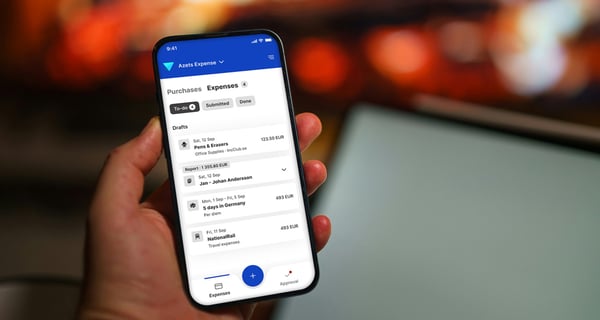

The future lies in automation, analytics for strategic insights, and seamless system integrations for heightened efficiency and security in a digitized world. But what trends do we see for expense management and finance in 2024? We reached out to our partners to get their thoughts:
“In 2024, the expense management landscape will witness pivotal trends. Automation will take centre stage as AI-driven tools simplify expense reporting, reducing administrative burdens and boosting accuracy. Sustainability will become a core concern, with organizations integrating sustainability metrics into expense management software to showcase their commitment to corporate responsibility.
Data analytics and real-time reporting will continue to gain traction, empowering finance professionals with insights into spending patterns for proactive decision-making and cost optimization. These trends align with our dedication to simplifying travel management processes.”
– Marc Will, Managing Director, Intertours
“In 2024, the expense management and finance industry will be shaped by several key trends. Digitization and automation will continue to be central focus areas to continuously optimize and minimize manual work tasks and the risk of errors. An important trend is digital receipt management, which reduces paper use and simplifies the disbursement process.
In addition, the integration with the business system is a key advantage. By integrating expense management with the business system, companies get a seamless solution for expense management and financial management, which increases efficiency and provides better control over financial resources. This promotes holistic thinking and resource optimization within business operations, which is part of the entire business development.”
– Hossein Mohaddes, Sales & Partner Manager, Monitor ERP Systems
“The climate footprint of the employees' purchases and trips will become more and more important in the coming years. Many companies write in their travel policy that their employees must choose environmentally friendly and sustainable alternatives, and it is increasingly becoming a requirement from customers and suppliers that the organization takes responsibility for its environmental impact.
Machine learning and AI are already used today in expense/travel management, and in the future, it will be increasingly important to be able to flag expenses that do not meet the company's requirements/policy. The technology will also make it easier to analyze your costs to optimize your budget.
Fewer and fewer work manually with their expense management, and for many, that way of working has long been history. With upcoming requirements for climate reporting and companies' increased commitment to the environment and efficiency, digitization is a matter of course. And many start with their expenditure management, precisely because it so quickly produces effect and results.”
– Ann-Catrine Hermansson, Product & Partner Manager, Visma PX
“For 2024, it looks like the trend is moving towards an increasingly integrated and automated management of receipts and expenses, combined with automated management. By using advanced technologies such as AI and machine learning, organizations can expect the processes for collecting and managing receipts and expenses to become smarter and more automated – with increased accuracy and efficiency in the identification, categorization and accounting of receipts and expenses.
Integration with automated invoice processing contributes to a more unified and comprehensive management for the user, the manager and the finance and payroll department, where the boundaries between different processors are looking to create a seamless user experience. Businesses can benefit from reduced manual input, faster processing, and reduced risk of errors, such as having the expense report automatically matched with the credit card invoice, gaining insight and being able to predict. They receive the expense reports on an ongoing basis instead of at the end of the month. This allows organizations to focus on more value-creating tasks and increase productivity.”
– Marcus Egberth, Head of Aftermarket Sales, MediusGo
“Is the digitization of expense management still a current discussion? For several years, we have been moving towards digitized receipt management, and we have largely reached it; the prerequisites for fully digitized management are already there. The question is, what is the future of expense management?
The latest trends in receipt management involve direct handling of expenses through, for example, direct payment and a seamless process where all systems work together to minimize duplication of work. We are moving towards a more system-intensive everyday life, and the demand for technical knowledge is increasing to effectively navigate this new reality.
In a system-intensive world, integration between different systems becomes crucial to avoid unnecessary repetitions and inaccuracies. Every company has a central platform they believe should govern our everyday lives, and integrating systems is essential to avoid inefficiencies and increased risk of errors.
We have made it to a digitized world; the challenge is getting maximum efficiency and security through this digitization.”
– Viktor Bäckström, Sales Business Solutions, ECIT
“After some years of declining travel during and after the pandemic, the trend has shifted – many companies are once again choosing physical meetings over digital and travelling more for work and business. This has led to a renewed increase in the need for efficient management of travel and entertainment expenses, and there is every indication that this trend will continue in 2024.
Awareness of climate impact and sustainability is also increasing, and many companies want and need to disclose their travel costs in their sustainability reports. This, in turn, requires well-functioning expense reporting management with the possibility of automatic data collection. When it is possible to obtain climate calculations related to the expenses, there are further opportunities to facilitate reporting.
At the same time, the economic climate is tough. Many companies are facing financial challenges and need more control over their expenses. Being able to closely monitor costs is essential to identify opportunities to save money. Agile, digital expense management can facilitate sustainable economic growth even in challenging times.”
– Thomas Asplundh, Product Manager VIEW Expense, VIEW Group Sverige
“The trend is still clear that the role of employees in the systems is becoming increasingly central. The employee also places greater demands on flexible functions that are automated, for example, expense management, driving records and cards. The administrator or manager, in turn, has similar requirements for automation when it comes to planning and controls, which still takes a lot of time but can be shortened with modern technology.
With increasingly higher costs of business trips, it is becoming more and more problematic for employees to have outstanding reimbursements. Offering faster reimbursement methods, such as Swish Payout or bank integrations, helps companies become more attractive employers. In society, there is an expectation that the system should be flexible and payments in real-time will be a natural part of the future.”
– Johan Jönsson, Commercial Product Owner, Hogia
“In 2024, expense management undergoes a pivotal transformation, with a continued focus on automation, integration, and seamless operations. User experience is still essential, and leading expense management solutions will continue to get faster and easier to use for employees, managers and finance teams. Some examples of features we can look forward to are fewer clicks to submit expenses, smoother approval flows and improved card connections.
In today's financial climate, expedited reimbursements emerge as a key benefit for organizations when selecting an expense management solution. The future lies in seamlessly integrated systems, ensuring maximum efficiency and bolstered security in our digitised world.”
– Patrick Olsson, CEO, Findity
The landscape of expense management is on the brink of transformation in 2024, witnessing pivotal trends that promise to reshape financial operations. As organizations strive for increased efficiency, accuracy, and responsible practices, leaders in the field are embracing cutting-edge technologies and integrated solutions to streamline processes.
From AI-driven tools simplifying reporting to the growing emphasis on sustainability metrics within expense management software, these trends reflect a shift towards a more connected and automated approach to financial operations. Do you agree?



